Review for RahXephon Complete Collection
Introduction
Could 2013 be a renaissance for ADV in the UK? The company isn’t coming back, but the titles most certainly are. It’s taken a good while too. In the US, the corpse hadn’t even stopped twitching before rising like a zombie, Sentai Filmworks and Section 23 had returned to carry on where ADV had left off, while a substantial chunk of old ADV licences were devoured by Funimation, and re-released under their label. There was barely a blip in continuity. In the UK however, aside from the occasional title such as Ah My Goddess Season 2 and Guyver, it’s been four years since we’ve seen ADV titles on our shop shelves. 2013 has seen no less than seven ADV titles come back to the UK though, and I’m catching up on shows I missed the first time around.
For Manga Entertainment it’s brand awareness, as they have re-released Last Exile in anticipation of Fam: The Silver Wing, while after releasing Hellsing Ultimate, it only makes sense to release the original Hellsing too. For MVM, it’s about unfinished business, as they address a couple of titles that were left hanging when ADV collapsed, Red Garden and Pumpkin Scissors. It was actually 101 Films that got the whole ball rolling way back in January when they dug out Elfen Lied from the back catalogue and gave it a polish. The pricing gave me pause, but contrary to my cynical expectations, they’re continuing with the back catalogue goodness. Gainax may have decided to sit on the Evangelion series while they sell the bejesus out of the feature films, a decision that is infuriating several people who want to watch the series now that they have actually seen the movies. But back at the turn of the millennium, the other giant robot (but not actually robot) anime that everyone was raving about was RahXephon, and this summer 101 Films are re-releasing that series along with its tie-in movie, as a complete 8 disc collection. The price doesn’t look too bad either. They’ve also dug Lady Death out of the archives, but the less said about that, the better.
Life was pretty straightforward for Ayato Kamina, pretty much an everyday teen living in Tokyo, with life revolving around high school and friends. So, Tokyo is the only city left on Earth, and its 23 million inhabitants the last survivors of the human race, but otherwise a teenager in 2015 is much like a teenager of any other time.
Except suddenly invaders appear and launch a devastating attack on the city. Giant figures called Dolems emerge to defend it, an enigmatic girl named Reika appears and leads Ayato to a giant egg, from which another giant robot named RahXephon hatches, a robot that he can control, and in the resulting mayhem, people, including people he knows, start bleeding blue! If this isn’t enough for him to deal with, another mysterious woman named Haruka appears, offering to tell him the truth if he’ll go with her.
The reality is even more fantastic, as using the power of RahXephon, he’s able to escape the confines of the sealed city, and he finds himself in the outside world. He’s outside what is now known as Tokyo Jupiter, the city sealed behind an impenetrable barrier similar in appearance to the largest planet, the city where he lived. The world isn’t a depopulated wasteland after all, and the forces of mankind have been fighting a desperate battle against invaders called the Mu, invaders that unbeknownst to its residents, have long since conquered and ruled over Tokyo Jupiter. Eating this red pill also reveals a shocking truth to Ayato, while it may have been 2015 in Tokyo Jupiter, in the world outside, the year is 2027.
This eight disc collection from 101 Films contains the television series across seven discs, plus the spin-off movie on an eighth. The movie is reviewed at the end, after the review for the series.
Orchestration 1: Threshold
1. Invasion of the Capital
2. God and Man Awaken
3. City of Two
4. His Own Watch
5. Nirai Kanai
Orchestration 2: Tonal Pattern
6. Obliterated Cities
7. Day of Assembly
8. Bitterly Cold Holy Night
9. Small Shrine of Time
Orchestration 3: Harmonic Convergence
10. Sonata of Reminiscence
11. Kyoja Circuit
12. The Black Egg
Orchestration 4: Dissonance
13. Human Specimen 1
14. The Boy in the Mirror
15. The Children’s Night
16. Island of Others
Orchestration 5: Synaesthesia
17. Return to the Labyrinth
18. The Bond of Blue Blood
19. Blue Friend
Orchestration 6: Aria
20. The Artisan’s Battle
21. The Carved Seal of Xephon
22. Operation Jupiter Obliteration
23. From Here to Eternity
Orchestration 7: Crescendo
24. Doorway to the Tuning
25. God’s Uncertain Music
26. Far Beyond Eternity
Picture
RahXephon dates from 2001 and the masters from which these discs are pressed are from 2003. You won’t be making the most of your up to date home cinema set-up here. The 4:3 transfer is an NTSC-PAL standards conversion, soft and with just a hint of ghosting and blended frames. It comes across well enough to enjoy the show without any major complaints, but compared to the current crop of native PAL anime it will be found wanting. RahXephon’s age is more apparent in the actual animation, one of the earlier digipaint shows that were accomplished in the innards of a computer, rather than the traditional cel and paint techniques. It has all the hallmarks of such a show, with characters that don’t always fit in with the backgrounds, limited animation in static scenes, especially when characters are speaking, and a general lack of crispness in character outlines. Slip yourself into the mindset of an anime fan ten years ago, and all of this will be perfectly normal.
An interesting thing is that you can see the seeds of future anime in this, and if you move the self same animation techniques forward by five years, you can well perceive elements of Kurau Phantom Memory’s animation in RahXephon.
Sound
You have the choice between DD 5.1 English and DD 2.0 Japanese, with optional translated subtitles and a songs and signs track. I went with the original language track and was very happy with it, with the characters appropriately cast, the action coming across with impact, and the stereo giving the show some space, especially when put through a Prologic Decoder. RahXephon is a show that has music as an integral part of the story, and the soundtrack does show a little more consideration compared to the average anime. It’s a blend of classical pieces and music created especially for the show, and it really works well to tell the story. It also has a theme song composed by Yoko Kanno, which is an instant plus point. I gave the English dub a try long enough to hear that it was a glorified up-mix of the stereo, but didn’t listen long enough to form an opinion about the dub cast.
Once again, these are the old ADV discs repackaged, which means that the out of sync subtitles on episode 2 that you’ll see with this collection are identical to the out of sync subtitles on the ten year old discs. Other than that, they are free of error and accurately timed.
Extras
These are the original ADV discs, re-labelled and repackaged. You get them in a Scanavo brick, two overlapping at the front, two overlapping at the rear, and a hinged central panel that holds the other four, two overlapping on each side. Scanavo means good luck getting them out. The brick comes in a card o-ring that simply replicates the sleeve artwork
All discs have animated menus, and jacket pictures to look at when the discs are at rest in compatible players.
Disc 1
Here you’ll find the clean credits, a special Japanese promo trailer that lasts 3 minutes, and a 4 minute slideshow of production art.
Disc 2
Once again you get the clean credits and a 4-minute slideshow of production art. More substantial is the Interview with the English Cast, which lasts 14 minutes. In it, Kira Vincent-Davis (Quon), Monica Rial (Haruko) and Chris Patton (Ayato) are asked a few questions about their characters, the show, and the recording process. Note that there are a few spoilers, so best to leave it till later in the series to watch.
Disc 3
It seems that a constant for these discs are the clean credits and the 4-minute slideshow of production art. Unique to disc 3, is the RahXephon early production promo, largely a slideshow of concept art with which to promote the forthcoming series back in 2001.
Disc 4
Clean credits and 4-minute Production Art slideshow all present and accounted for, the big extra on this disc is the Interview with the English Cast II, which this time lasts a substantial 42 minutes. This time it’s Jay Hickman (Itsuki Kisaragi), Illich Guardiola (Makoto Isshiki), Mandy Clark (Reika Mishima), and Kelly Manison (Sayoko Nanamori). Unfortunately it’s only 10 minutes RahXephon, and 32 minutes video CVs.
Disc 5
As well as the clean credits and 4-minute Production Art slideshow, you also get a 1 minute slideshow featuring Japanese Cover Artwork, and a 10 minute interview with the character designer for the show, Hiroki Kanno.
Disc 6
This time the Production Art slideshow is just 3 minutes, and the textless ending is the English version. The textless opening is the same though. The big extra is the Interview with the English Cast – Finale, which lasts 44 minutes. Once more it’s 10 minutes of RahXephon related talk near the end of the piece, the rest of it a glorified CV for the actors. Interviewed this time around are Alison Keith (Cathy MacMahon), Tiffany Grant (Kim Hotal), John Gremillion (Kunugi), John Swasey (Rikudoh), and Kelli Cousins (Helena). Once more, leave this featurette until after you have watched the series in its entirety, lest you want the story spoiled.
Disc 7
One final time, we get the textless opening, two textless closings, including the one for the final episode, and 3 minutes worth of Production Art in a slideshow. We also get a 5 minute Fate of Katun music video, set to scenes from the show. The most substantial extra on this disc is the Interview with the Japanese Staff and Crew, which lasts 20 minutes. Director Yutaka Izubuchi holds the piece together, but there are interjections from character and mecha designers, the animation director and the producer, as well as the original Japanese voice cast.
Across all the discs, you’ll find trailers for mostly deleted titles such as Go Nagai’s The Devil Lady, Spriggan, Burn Up Excess, Noir, Boogiepop Phantom, Dai Guard, Dirty Pair Flash, Voices of a Distant Star, King of Bandit Jing, Full Metal Panic, Sonic the Hedgehog, the Martian Successor Nadesico Movie: Prince of Darkness, Zaion, Najica Blitz Tactics, Sakura Wars, Angelic Layer, Final Fantasy Unlimited, Pre-Tear, Neon Genesis Evangelion: Director’s Cut, Rune Soldier, Mazinkaiser, Kino’s Journey, Generator Gawl, Last Exile, and Gad Guard.
Conclusion
Fashions change so rapidly, and that’s no less true in anime as it is in anything else. Back when RahXephon was made, every other show was like it, delivering in terms of story and character, and not necessarily beholden to the mainstream otaku predilections for cliché and tropes. Today, shows like RahXephon are in the minority, with the mainstream filled with all manner of cute and moe, with shows ticking boxes off an otaku checklist for what anime should be. I can’t tell you how refreshing it is to just pick up a show that I have never seen before, and just get lost in a story for ten or so hours. RahXephon has an intelligent and engrossing story, one that makes you work to get the most out of it, and has interesting and fleshed out characters. It plays with complex philosophies, is steeped in history and mythology, and is very much an adult show. That doesn’t mean adult as in sex and violence by the way.
This should be the kind of show that I fall in love with, the show that I embrace, take to heart, put on the ‘pride of place’ shelf along with shows like Wolf’s Rain, Planetes, and yes, Neon Genesis Evangelion. I find that I can’t do that, as something about RahXephon just kept it at a distance from me. It became a show that I appreciated intellectually, found a dispassionate satisfaction in unravelling the story, but I never really engaged fully with the characters, or became invested in the reality that it was spinning. It’s a good show, but it’s not a great one.
Those comparisons with Neon Genesis Evangelion might seem justified on the face of it. The ingredients are pretty much the same, teenage protagonists, giant robots which aren’t actually robots, and a whole lot of mythology, but RahXephon comes up with a completely different dish. For one thing, it doesn’t do the same level of damaged teenage angst, and for another thing, the narrative is brought into far clearer focus here. This show is as equally about the story as it is the characters. That may be one of its failings, as the story in RahXephon doesn’t stand up to that much scrutiny. It is one grand story, despite its episodic format, and one issue is the need to have a climax at the end of each episode. It begins to feel as contrived as a 24 cliff-hanger after a while, although with RahXephon, the ground state is the plot twist. There are so many plot twists and revelations in its story that you could wind up with whiplash trying to keep track of them all. As such it becomes a victim of small universe syndrome, which is a little ironic given its premise.
What I found most frustrating about RahXephon was that despite all its plot twists and surprise revelations, especially towards the end; its grip was surprisingly tenacious when it came to the actual nuts and bolt of the story. The story develops in a spectacular way as you might expect, fantastic things happen, worlds collide, the nature of reality becomes strained, and as mentioned there are these earth-shattering revelations and plot twists. You’re expected to take them at face value, just as the characters are, and you wonder why they don’t stop to question. RahXephon never fills in the blanks behind all this. I wound up feeling disappointed by the lack of resolution to certain character arcs (and dead isn’t necessarily a resolution). I’m used to filling in the blanks with anime, as not every show has the time or the inclination to serve as an exposition machine, but RahXephon is an iceberg of a show. We get to see just ten percent of what the story is about. Ninety percent, most of it really interesting and enlightening remains hidden beneath the surface. At the end of its run of episodes I was left with far too many questions compared to answers.
But if you can be satisfied with the lingering mystery after watching RahXephon, then I do recommend it. It is so refreshing to see a show that doesn’t pander to the mainstream. And where the show really does impress is in the complexity and humanity of its characters. These aren’t just mono-faceted fleeting creations. They have a life and dimension beyond the show itself, and the emotional conflicts that they face, and how they resolve, or indeed fail to resolve them, is the strongest aspect of the show, something which is rarely seen in anime. In terms of the themes that RahXephon explores, and despite the lack of giant robots (which aren’t actually robots), I feel that Wolf’s Rain does it better, but there’s no reason why you shouldn’t have both.
RahXephon: The Motion Picture – Pluralitas Concentio
Just in case you were thinking that the tie-in movie was a recent anime phenomenon, with fans eagerly awaiting big screen versions of Steins;Gate, Madoka Magica, Bodacious Space Pirates, here’s proof, if you needed it, that anime TV shows have been spinning off feature films for as long as there have been anime TV shows. The question as always is what to do with the film. Do you tell a completely new story with the old characters, as in Trigun and Cowboy Bebop? Do you retell the television series story with new animation, as in The Adolescence of Utena? Do you simply create a compilation movie, using the TV footage to retell the story in 2 hours, without pesky adverts, credit sequences, and recaps? With TV series with concrete and irreversible endings, that is usually the only option available, and RahXephon is one such series.
But 10 hours of TV anime story is a lot to cull down into two hours, especially for a story as complex and intricate as RahXephon’s. The danger is that it becomes a collection of scenes tied together by voiceover exposition. That isn’t going to please fans that have shelled out for a cinema ticket. So for the RahXephon movie, they tried to do both simultaneously. They used the existing television footage, added a few newly animated scenes, most significantly to bookend the film, and tried to tell a completely new story with it. It’s even more extreme than when Space Raiders recycled the effects footage from Battle Beyond the Stars! It doesn’t quite work.
The basic story is the same, but several character arcs have been cut completely and it’s the character dynamic between Ayato and Haruka that carries the film, holds the narrative focus, and it has been altered significantly to drive the story. The collision of worlds, the battle against the Dolem and the Mu, the conspiracies at TERRA and the Foundation, all happen in the background of Ayato and Haruka’s story.
The Disc
RahXephon: The Motion Picture is presented on a dual layer disc, Disc 8 in this collection, with a transfer very similar to that of the TV series. It’s a 4:3 regular image, NTSC-PAL converted, although the footage recycled from the TV series is a little crisper and better defined in the movie, while the newly animated sequences actually have a greater depth and fluidity in the animation compared to the TV show. That’s particularly apparent in the opening sequence. You have the choice between DD 5.1 English and Japanese, with optional subtitles and signs, but in the film, the surround track really does deliver in terms of effects and making use of the soundstage. It really is a step up from the TV series in that respect.
Conclusion
612 minutes of TV series into 116 minutes of movie just doesn’t go. The RahXephon Movie sacrifices far too much in an effort to make its story flow, and the resulting mess just doesn’t hold up to scrutiny. It’s all over the place. The signs are apparent from the first scene, with the film ditching the enigmatic storytelling of the TV show in favour of an info-dump of exposition. The first scene tells you pretty much all that the story is about. Heaven help you if you actually watch the movie before the TV series, as it’s like that obnoxious guy on the train, talking on his mobile about the twist in the Sixth Sense before anyone else has had a chance to see the movie (I’m still sore about that).
Just to keep you up to date with events, the RahXephon movie will pause in its narrative every once in a while to supply another info dump. Then there is the actual battle with the Mu, the conflict between TERRA and the alien menace, in which Ayato is a willing participant in the RahXephon mecha. This is the highlights package, the best bits of action from the TV show, put together with little thought to character or narrative. It just serves to break things up from the love story.
And that’s really what the RahXephon movie is about, the love between Haruka and Ayato, the relationship that has to be rewritten to make the film work. In the series, Ayato doesn’t realise who Haruka is, is instead fixated by the girl in his visions, the girl he can’t stop painting, without knowing who she is either. In the movie, he realises who Haruka is early on, and the two get close. But by using the television footage, it causes problems for the storytelling, a problem that is given a wholly unsatisfying solution by giving Ayato amnesia, curing it, and then giving it to him again.
The RahXephon Movie just doesn’t work. You’ll watch it once as an idle curiosity, but then put it back in the box, where over the centuries it will become fused to the clips holding the disc in place. The RahXephon TV series on the other hand you’ll watch again and again. 4/10 for the movie.
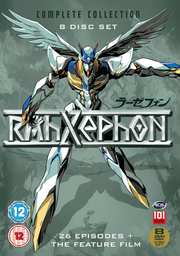
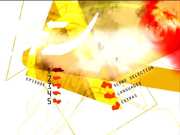
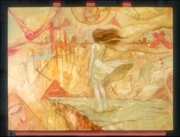

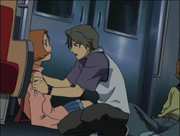
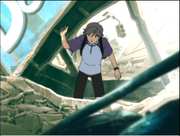
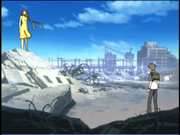
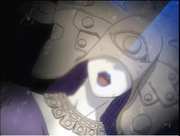
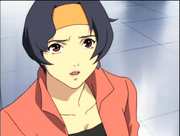
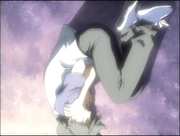
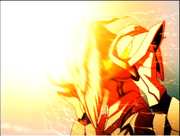
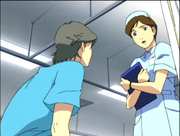
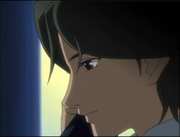
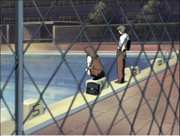
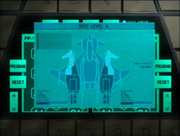
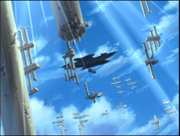
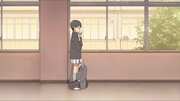
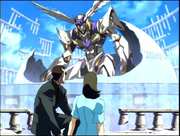
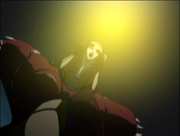
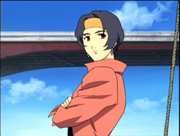
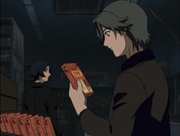
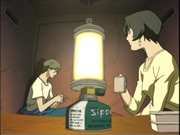
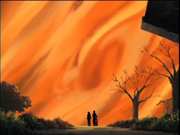
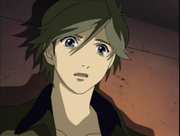
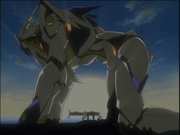
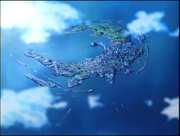
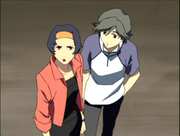
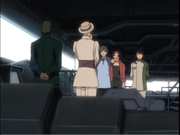
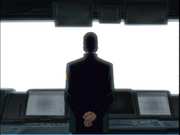
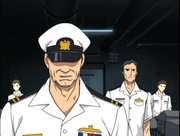
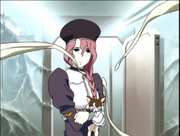
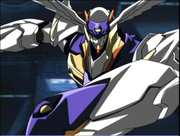
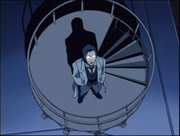
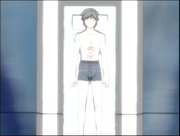
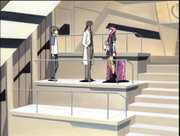
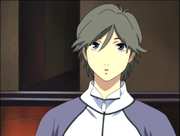
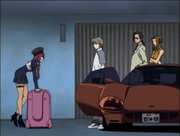
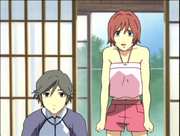
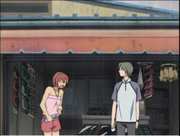
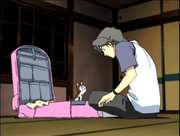
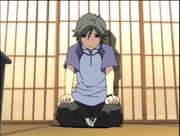
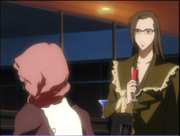

















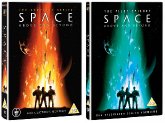






































Your Opinions and Comments
Be the first to post a comment!